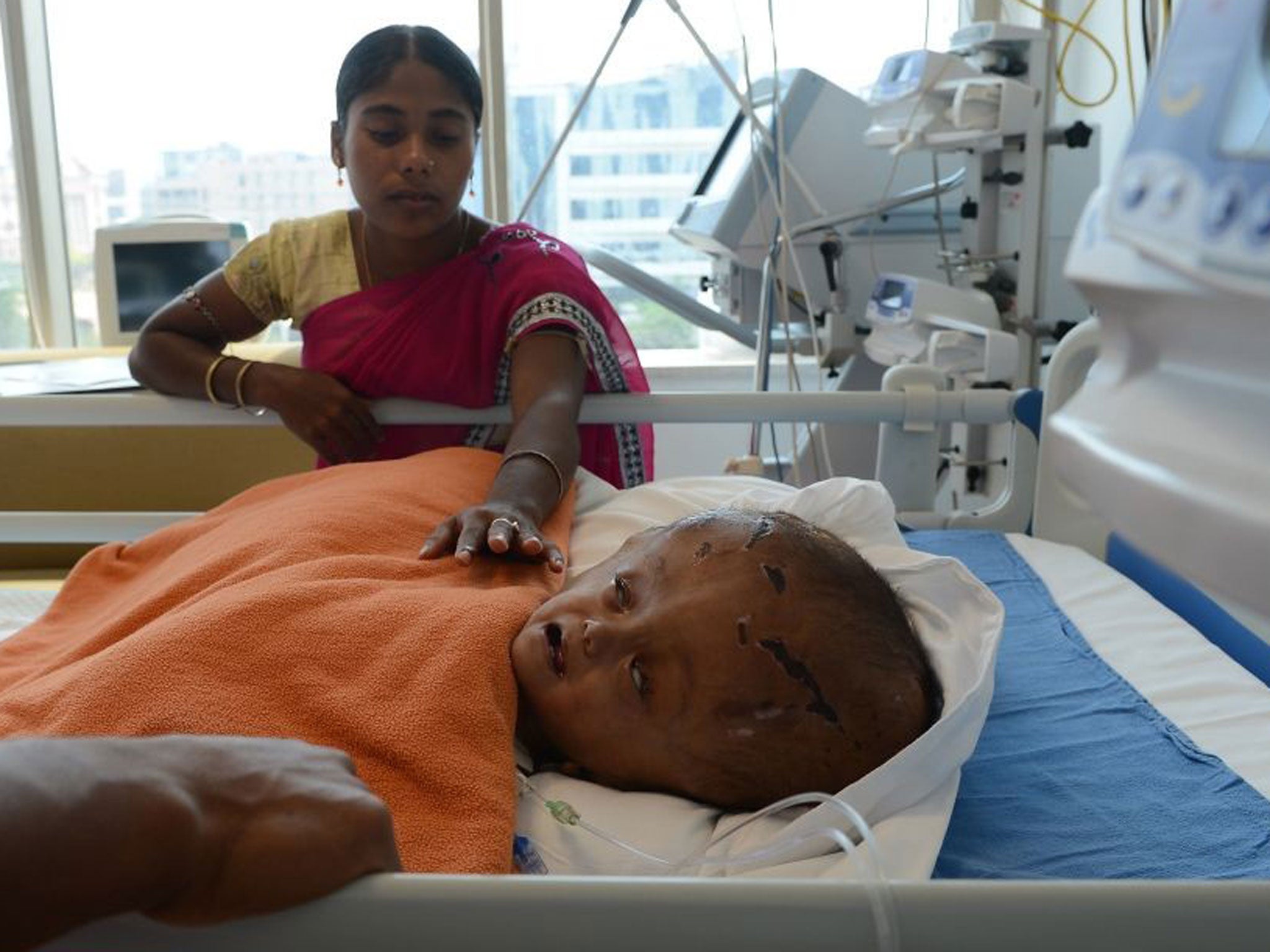Roona Begum - the Indian girl whose head had swollen to twice its usual size - undergoes 'perfect' surgery in New Delhi
Surgery which was donated after viral pictures, but the baby will still require lots of medical care

Your support helps us to tell the story
From reproductive rights to climate change to Big Tech, The Independent is on the ground when the story is developing. Whether it's investigating the financials of Elon Musk's pro-Trump PAC or producing our latest documentary, 'The A Word', which shines a light on the American women fighting for reproductive rights, we know how important it is to parse out the facts from the messaging.
At such a critical moment in US history, we need reporters on the ground. Your donation allows us to keep sending journalists to speak to both sides of the story.
The Independent is trusted by Americans across the entire political spectrum. And unlike many other quality news outlets, we choose not to lock Americans out of our reporting and analysis with paywalls. We believe quality journalism should be available to everyone, paid for by those who can afford it.
Your support makes all the difference.The 15-month-old Indian girl whose life-threateningly swollen head was in pictures sent around the world has undergone "perfect" surgery in New Delhi.
Roona Begum, from the village of Jirania Khola in India's remote north-east, had her picture taken by a press photographer last month. She suffers from hydrocephalus, an illness which causes cerebrospinal fluid to build up on the brain, inflating the skull.
Local doctors told Roona's 18-year-old father Abdul Rahman she would have to go to a better-equipped hospital. The labourer - who earns 150 rupees (£1.80) a day - and Roona's 25-year-old mother Fatema Khatun knew they couldn't afford to.
The rest of Roona's body couldn't keep up with her head's growth. She couldn't crawl, sit up or roll over, and the skin on the base of her head was infected because of restricted blood flow. She was severely malnourished, and couldn't see much because her expanding head had forced her eyes to recess deep into their sockets.
The most common treatment for hydrocephalus involves inserting a shunt to drain fluid away from the brain and towards another part of the body, where it can be absorbed into the bloodstream.
The circulation of Roona's photographs by AFP provoked well-wishers to contact the agency and offer donations. Upon seeing the pictures, two Oslo-based college students launched an online appeal which raised £34,000.
India's Fortis Healthcare group flew the family over 1,000 miles from their home in Tripura state to its facility near New Delhi so that Roona could receive life-saving surgery.
Leading Indian neurosurgeon Sandeep Vaishya, the head of neurosurgery at Fortis hospital, donated his services for free, examining Roona to see if surgery would be possible.
Three days after she was admitted, doctors pierced Roona's scalp and drained fluid from her head into a bag. Nearly two weeks after they began the draining process, her head's circumference had dropped from 94 to 69 centimeters, with three litres of fluid drained.
Her pupils are now visible, her hair thicker, and she can open her mouth more easily.
During an hour-long operation, Vaishya made a series of incisions along the right side of her head and stomach and then used a drill to pierce her skull before inserting a shunt, catheter and valve. The shunt system would drain the fluid out of her head and towards her abdomen where it could be absorbed into the bloodstream.
It was "perfect" surgery, he told AFP, adding that it was "too early to say what the quality of her future life will be like." She would need "extensive physiotherapy" and plenty of nutrition, he added. "Her body will have to grow strong so she can learn to sit up and move about and live a normal life."
"We will remodel her skull, move the bones and fix them with plates to reduce her head size so she can grow normally," he said.
Rahman said he wanted to "thank the doctors, the well-wishers, everyone who has been on this journey with my family".
“The day her head looks normal, then I will feel like I can relax a little, I will know then that we have won our fight."
Join our commenting forum
Join thought-provoking conversations, follow other Independent readers and see their replies
Comments